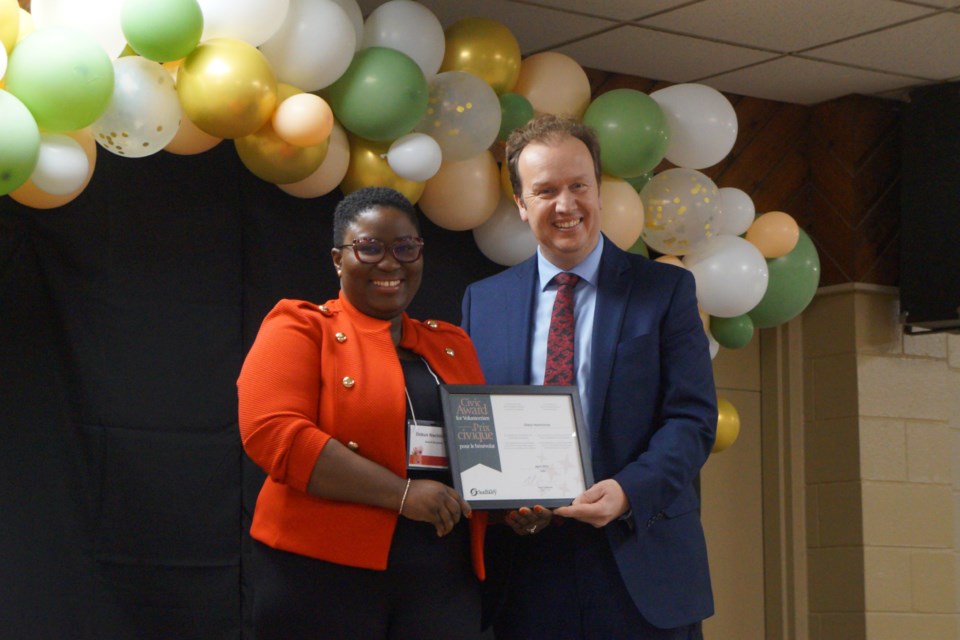SUDBURY - The year 2019 meant a major life change for Dokun Nochirionye, fondly known as Mrs. Noch.
Not just moving to a new country, but arriving there while pregnant.
“I went from being a family of three to being a family of four in a different country, trying to find employment, trying to figure out my life, trying to understand the social system, the bus system, even the weather. It was all very, very different,” she said.
Nochirionye worked at Citibank in Nigeria before she left, but decided to try to learn new skills. She’d been trying her hand at food blogging, and so she went into food service, later becoming a dietary aide. She also began to volunteer and that led to her to a City of Greater Sudbury Civic Award in April for her work with the Nigerian Community Association, Children’s Aid Society of Sudbury Manitoulin, and the United Way, with a focus on youth and family.
But it was when the pandemic began to change her child’s life she found her true purpose, she told Sudbury.com. She began hosting online social groups for children in her community, then for their parents. Now, she has begun Thriving African Families, and hopes to support families in Sudbury with African heritage, whether they are newcomers to the area or have been here many years. It’s all about relieving the isolation, she said, which came to a head for many during the pandemic.
“I found that my five-year-old wasn't really doing well,” she said, “And he's quite the outgoing, personable type.”

Nochirionye decided that perhaps other children in her community were feeling the same way, and decided to take to Zoom, first offering what she calls a “spiritual education” for children, but really, it was a chance to connect, even virtually.
She put the word out about her new Zoom meet up.
“To my surprise, 17 kids showed up online. And I thought, ‘wait, do you all need it that much?”
She hosted her next zoom class two weeks later, and 25 children registered.
“They were happy to see their friends. I would give them a few minutes before and after class to just chat with each other and just say hello and just have a banter,” Nochirionye said. “I could see how that workshop was helping the children to thrive at a time where there was so much social isolation and they were questioning everything.”
So were their parents, she said.
“The whole world was questioning everything, so that online class became like a haven where children of African heritage could gather and find commonality, conversation, learning and even learn how to use technology better,” said Nochirionye. “They even had fun exploring the different tabs and functions of Zoom, experimenting, just clicking all sorts of things. It was new, and it was fun.”
And yes, they did drive her a little up the wall. “But they were learning,” she said with a laugh.
With time, she said she began offering opportunities for the older students to co-facilitate the class. From there, she started noticing that children asked Mrs. Noch if there were any classes for parents.
“They needed to understand how to raise their kids in a different culture, and in the context of the pandemic,” she said. “That was how it just rolled into other things and more requests and more demands from the community, and I found that I was able to meet those needs through the community engagement activities, and that's how thriving African families evolved.
“And it just became a community movement from there on, she said. “And that was how I started Thriving African Families.”
Now a registered nonprofit, Nochirionye expanded programming based on the expressed needs of the community, and they now include social and parenting groups, support classes for men and boys, as well as practical skills like financial literacy, planning for retirement, or buying a home, through the lens of culture and understanding how things can be new, and possible, compare to what they are used to.
And all of it through the lens of African cultures.
“We want to be able to do more and serve our communities better,” she said, “because the community keeps growing, the numbers keep growing on an annual basis and I'm seeing a lot of gaps in the community that I know that we have the skills and the expertise and the resources to close.”
And now Nochirionye is looking to grow her work, and hopes to partner with existing social services to provide more culturally specific services.
“We have no plans of reinventing the wheel,” she said. “Many services already exist, but they're not culturally relevant to people of African heritage, and they need services from people who understand their culture, their background, their context, their trauma, and all of those things, and so they're able to provide the necessary assistance that people need.”
She said Thriving African Families is hoping for funding, but would also be happy to partner with community organizations “who want to invest in diversity and inclusion and having a community of people who truly thrive, regardless of their race or their gender or their nationality or their status,” she said.
“We're completely dedicated to ensuring that we have a more inclusive City of Greater Sudbury.”
For more information about Thriving African Families, visit thrivingafricanfamilies.org
